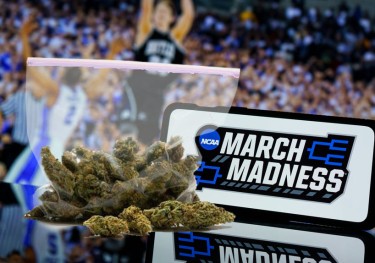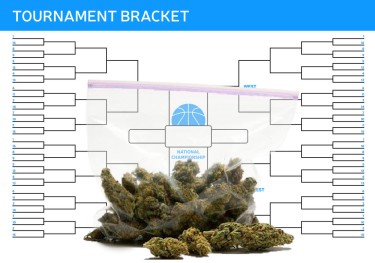
The Committee on Competitive Safeguards and Medical Aspects of Sports (CSMAS) within the National Collegiate Athletics Association (NCAA) has proposed eliminating marijuana from the list of banned substances. The NCAA will seek feedback from its members during the summer and may proceed with actions in the fall based on the received input.
The approval of all three governing bodies within the NCAA’s divisions is required to implement the policy change. This recent committee action was initiated in response to a request from Divisions II and III to evaluate the necessity of limiting drug testing to performance-enhancing substances.
The panel will also request approval from the Board of Governors to temporarily suspend THC testing for athletes during the NCAA championship. At the same time, the broader reform is being deliberated.
The committee has stated its recommendation to exclude cannabis from the list of prohibited substances, citing its view that marijuana is not a performance-enhancing drug. This perspective was deliberated upon during the Summit on Cannabinoids in College Athletics held in December.
Furthermore, the committee asserts that this reform aligns with a “harm reduction philosophy for cannabis, akin to approaches used for alcohol,” enabling the organization to concentrate on addressing issues related to problematic cannabis use.
Implementing the policy change would enable the NCAA to emphasize education regarding the health risks associated with current cannabis use and consumption methods. This would equip officials with the necessary knowledge to identify and explain relevant harm reduction and mitigation strategies to student-athletes who legally choose to consume cannabis.
In a press release on Friday, the NCAA stated that, along with the policy and testing modifications, the CSMAS also supported developing a comprehensive communication and education campaign to guide its members regarding cannabis.
Previous Policy Change
Last year, the NCAA implemented a policy change that raised the THC threshold for positive test results among college athletes from 35 to 150 nanograms per milliliter. This adjustment made the NCAA’s regulations align with those of the World Anti-Doping Agency (WADA).
Furthermore, an important committee proposes rules that no longer automatically render student-athletes ineligible to play after testing positive for marijuana.
Brian Hainline, the NCAA’s chief medical officer, expressed in a press release that reevaluating the NCAA’s approach to cannabis testing and management aligns with feedback received from the membership. This shift aims to better support and educate student-athletes in a society where public health perspectives and cultural views on cannabis use are evolving rapidly.
At the time, Brian Hainline, NCAA’s chief medical officer, emphasized that marijuana does not enhance performance. However, he highlighted the importance for member schools to actively engage student-athletes in discussions about substance use prevention and provide appropriate management and support when needed.
In contrast, the previous regulations for Division I, II, and III student-athletes state that a positive marijuana test immediately renders the player ineligible for 50 percent of the regular season. Subsequently, a second positive test would subject the athlete to the standard bylaws regarding banned substances, resulting in a full-season suspension.
Following thorough deliberation and extensive discussions on the recommendations the Drug Testing Subcommittee put forth, these modifications to the NCAA drug testing program were approved,” stated Stephanie Chu, Chair of CSMAS.
The discourse on drug testing in professional sports gained prominence last summer when U.S. sprinter Sha’Carri Richardson faced suspension from the Olympics due to a positive THC test. She acknowledged using cannabis in a state where it is legal after receiving the news of her mother’s passing.
Continued Reforms by Sports Organizations.
In response to the increasing legalization of cannabis in various states, sports organizations at different levels have been implementing reforms. For instance, the National Basketball Association (NBA) has eliminated THC from its drug testing requirements. It permits players to make passive investments in the cannabis industry.
However, the NBA clarified in May that players are not allowed to promote marijuana companies under the latest collective bargaining agreement. Earlier this year, Nevada sports regulators voted to submit a proposed regulatory amendment to the governor. The proposal aims to officially protect athletes from penalties related to the use or possession of marijuana following state law.
Meanwhile, in 2021, the UFC announced that they would no longer penalize fighters for testing positive for marijuana. The National Football League (NFL) drug testing policy also underwent significant changes in 2020 as part of a collective bargaining agreement.
Last year, Major League Baseball (MLB) made a significant announcement regarding its partnership with a well-known CBD brand. Charlotte’s Web Holdings, a prominent hemp-derived CBD company, signed an agreement with the league to become the “Official CBD of MLB.”
As part of this partnership, Charlotte’s Web introduced a line of cannabis products called “Sport” that prominently features the MLB logo. Along with a rights fee and a revenue share from sales, the baseball association reportedly received a portion of shares in the publicly traded Canadian company.
In a press release, MLB’s Chief Revenue Officer, Noah Garden, expressed his enthusiasm for the partnership with Charlotte’s Web, stating that as a frontrunner in the CBD industry, offering products that promote health and wellness, Charlotte’s Web is a valuable addition to the MLB family.
This collaboration marks a significant milestone in baseball and sports. We are excited about this partnership’s potential as CBD increasingly becomes an integral part of our players and fans’ health and wellness routines.
Conclusion
As cannabis-related policies continue to evolve across various sports organizations, including the NCAA, NBA, NFL, MLB, and UFC, there is a growing recognition of the need for reforms and adjustments. These changes aim to align regulations with shifting societal perspectives, prioritize education and harm reduction, and support the overall well-being of athletes. The sports world is adapting to the changing landscape of cannabis, embracing partnerships and exploring new approaches that reflect a more progressive and informed approach to substance use in athletics.
THE NCAA AND WEED, READ ON…
NCAA RAISES THE ALLOWABLE THC LIMITS FOR ATHLETES
- SEO Powered Content & PR Distribution. Get Amplified Today.
- PlatoData.Network Vertical Generative Ai. Empower Yourself. Access Here.
- PlatoAiStream. Web3 Intelligence. Knowledge Amplified. Access Here.
- PlatoESG. Automotive / EVs, Carbon, CleanTech, Energy, Environment, Solar, Waste Management. Access Here.
- BlockOffsets. Modernizing Environmental Offset Ownership. Access Here.
- Source: http://cannabis.net/blog/news/smoking-pot-in-college-is-now-allowed-for-athletes-ncaa-may-soon-remove-cannabis-from-drug-test




